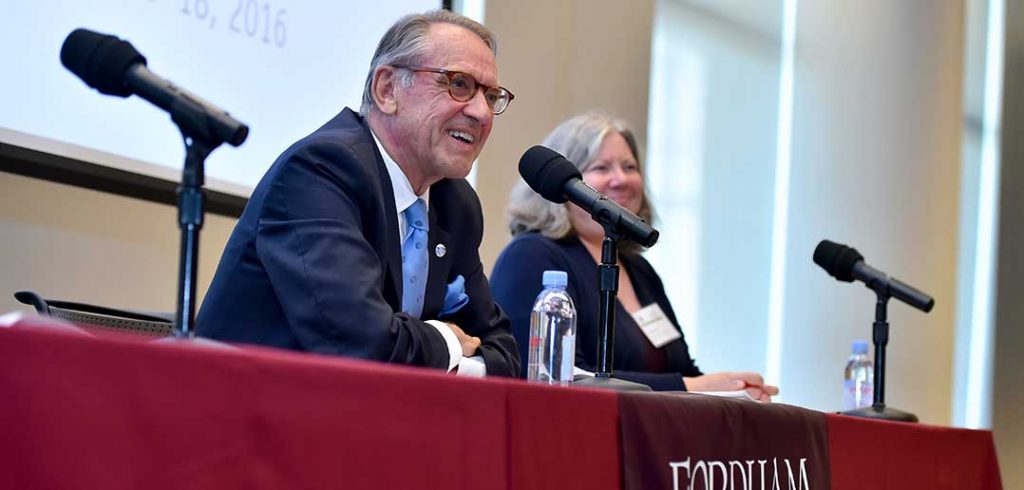The world’s biggest problems, such as climate change or migration, are too complicated for nations to solve themselves, said a top United Nations official speaking at Fordham’s Lincoln Center campus.
U.N. Deputy Secretary-General Jan Eliasson offered a mix of the sobering and inspirational in a keynote address he presented on June 16 to the annual meeting of the Academic Council on the United Nations System.
“Our job is to prove that in today’s world, the international formula is in the national interest of nation states, said Eliasson. “If you look at challenges like climate change or migration, it’s almost impossible to think of a national solution.”
The speech kicked off a three-day-long conference titled “Meeting the Challenges of Development and Dignity,” which acknowledged that the challenges facing the world today are steep, and filled with more uncertainty than ever. War is making a comeback, in much more complex forms, he said.
“I have mediated six conflicts in my life, and I would say the mediation task is hugely more complicated than it was earlier,” he said. He noted that there’s also been an erosion of the respect for basic human rights, exemplified by attacks on hospitals, schools, and other civilian centers.
Migration is a challenge too, but Eliasson pushed back forcefully against those who’d cast it in a negative light.
“Having been to the border of Syria just a month ago, and knowing how people are running away from Syria, it’s absurd to hear that refugees are connected to terror,” he said.
In fact, the International Monetary Fund has found that without migration, Europe and the United States would be experiencing negative population growth. Remittances sent to developing countries from 240 million migrants worldwide is two and a half times the total development assistance, making the migrants a key resource for worldwide development, he said.
Eliasson said the time has finally arrived for the full empowerment of women, and to tap the energy, charisma, and “tremendous potential” of young people. He suggested that leaders should stop wondering what they can do for them, and start asking what they can do with them.
“This young generation is the first one in history that has to think about whether we can live on this planet in 50 to 100 years. Therefore, it’s really time for us to mobilize the young people,” he said.
To tackle failing states, Eliasson suggested that the international community start paying attention to a conflict’s earliest warning signals, such as human rights violations. It costs the U.N. $28.5 billion a year to deal with the symptoms of an escalated conflict, he said, where people are dying in great numbers. But the international community does virtually nothing to reward prevention or recovery after a conflict.
“Why should we wait for mass atrocities, when in fact we could start acting on the human rights violations?” he said. “That’s the stage where we need to get going, so that we don’t end up with those horrors that we see around us in the world right now.”
“Some people may think this interferes with [a nation’s]internal affairs, but … the price for waiting is very heavy.”
The conference, one of two hosted by Fordham last week, was co-sponsored by Fordham’s Institute of International Humanitarian Affairs, the Graduate School of Arts and Sciences and Fordham’s Office of the Provost.

